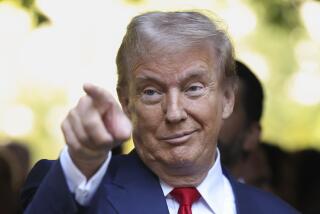COLUMN RIGHT/ ARTHUR B. LAFFER : Flatten Taxes, Fatten Jobs; Is That Unfair? : The Herschensohn plan would get rid of loopholes and raise revenue as well.
- Share via
Bruce Herschensohn’s proposed flat tax is under attack once again, only this time the attack is from the left.
Barbara Boxer says that Herschensohn’s flat tax proposal is unfair. Unfair doesn’t seem quite the proper word for a tax proposal that would increase production and employment. Everyone knows that people don’t work to pay taxes or invest to go bankrupt. The Herschensohn flat tax would realign incentives and unambiguously create jobs. Technicians may quibble over how many more jobs the Herschensohn proposal would create, but they all know there would be more.
President John F. Kennedy said it perfectly when defending his proposal to flatten tax rates in the 1960s: “The best form of welfare is still a good high-paying job.” I only wish President Bush and Gov. Wilson had listened to that message, which Herschensohn’s flat tax would promote.
The support for a flat tax is broad. The National Assn. of Business Economists policy survey report presents the responses of more than 250 NABE members to a survey on economic policy issues conducted in late April and early May. Surprisingly, a flat tax system received significant support. Although 40% favored the present graduated system, 60% favored either a stand-alone flat tax system or a flat tax system combined with a value-added tax. Herschensohn’s flat tax proposal would greatly simplify the tax codes.
Surely Boxer doesn’t think it “unfair” to let people know what they owe without having to consult with and pay for “experts.” With the Herschensohn proposal, the thick layer of sleaze that separates citizens from their government would go on a serious diet.
Does Boxer really believe that fairness is saying that you’re going to tax the rich at a high rate, and then dishing out tons of exemptions, exclusions and deductions to them under the table? Anyone who has ever been involved in the way things really work knows that many wealthy people, some with substantial incomes, don’t pay anything like the tax rates on the books. If the story of “The Three Little Pigs” were a political fairy-tale, their names would be complication, confusion and corruption.
The Herschensohn plan would get rid of those loopholes and raise lots of additional revenue as well. In fact, there is even a curve named after this greater revenue effect. Why Boxer thinks this is unfair doesn’t make any sense. Wouldn’t you like a lower deficit?
The last point on the unfair tack relates to the poor, the young, the disenfranchised, as they mingle with deductions, exemptions, exclusions and tax rates. The Boxer point is somewhat murky, but people like Boxer love to level the charge of unfairness against Herschensohn’s flat tax proposal, in large part because they simply don’t understand the tax codes, and the charges sound good on 30-second TV sound bites.
Boxer has to know, however, that people with no income don’t get any benefit from tax deductions or exemptions or low tax rates. The poorest of the poor need jobs and income, not tax breaks. Tax deductions, exemptions, exclusions and the like help the affluent the most and the poor the least. And for those with no income, they don’t do any good.
This just can’t be Boxer’s sense of fairness. Boxer doesn’t understand Herschensohn’s proposal, for if she did, she couldn’t call it unfair.
Herschensohn’s plan does the most for the low-income wage earners of America without destroying the spirit of enterprise. Workers and businesses alike will find that the rewards for doing business and keeping your nose to the grindstone will far exceed the rewards of trying to change the rules or buddying up to the referee.
What no one mentions, let alone addresses, are the poorest of the poor--people who don’t have incomes. These people cannot be helped by tax law changes unless we create more and better-paying jobs. And here the words of Kennedy ring true. The Herschensohn tax plan will create lots of new jobs and raise the pay for existing jobs.
Complicated tax laws so confuse everyone that layer upon layer of supposed experts and influence peddlers separate the everyday working person from his or her government. This is a rich field that attracts the greedy and the corrupt who literally prey on our innocence and sense of duty. The current tax code clearly needs reform. Herschensohn’s proposal would go a long way toward making our tax codes fairer.
More to Read
Inside the business of entertainment
The Wide Shot brings you news, analysis and insights on everything from streaming wars to production — and what it all means for the future.
You may occasionally receive promotional content from the Los Angeles Times.










